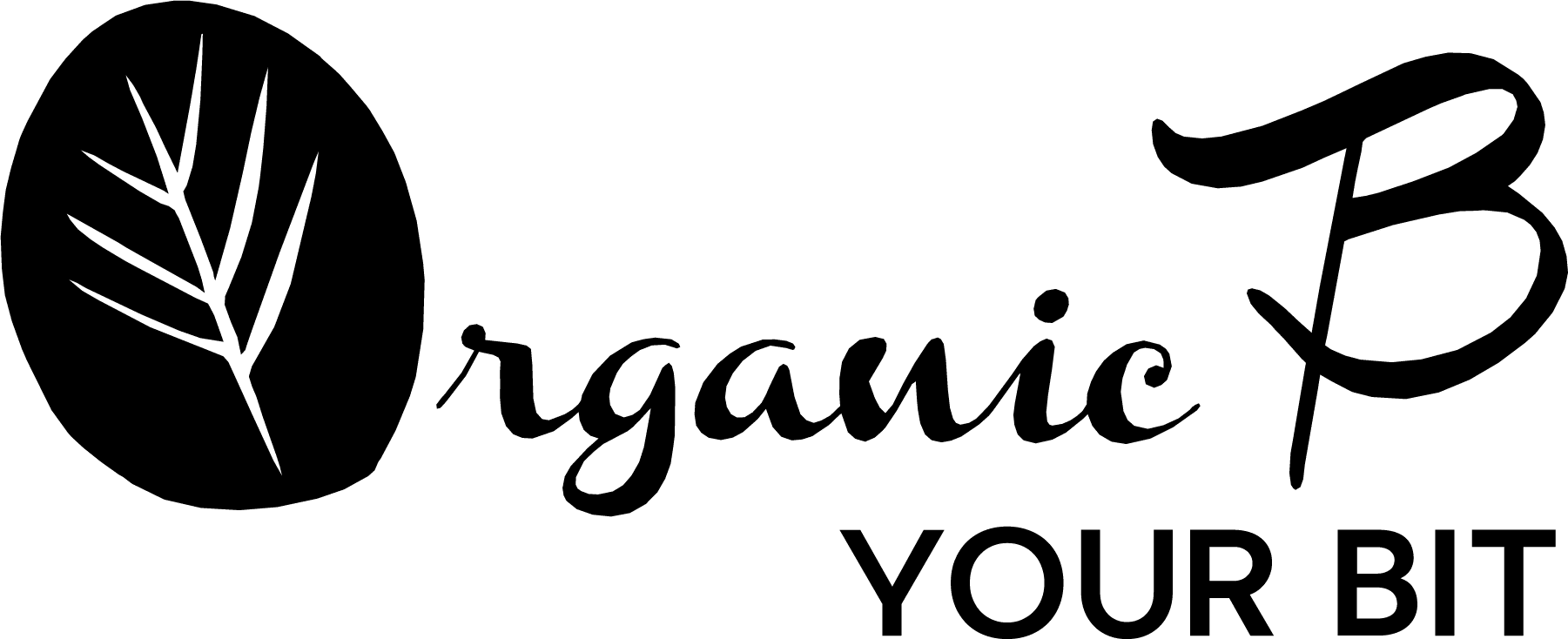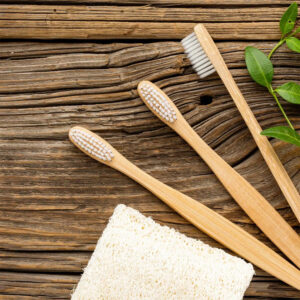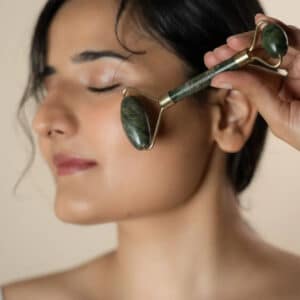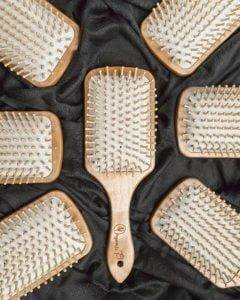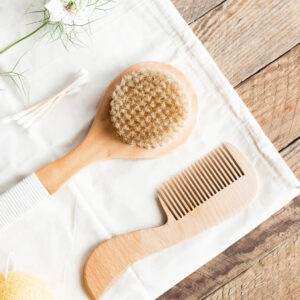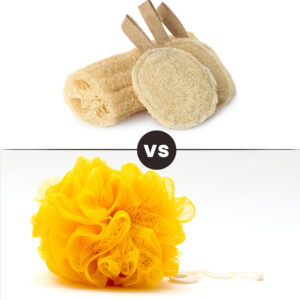Approximately 93% of consumers are concerned about the human impact and effect on the environment, and 77% want to learn how to start participating actively in the sustainable movement. And almost 100% want cleaner, whiter teeth without compromising with the environment.
While most of us do our bit by driving eco-friendly vehicles or taking extra care to sort our recycling each week, we should also focus on making an impact in the smallest ways. This includes switching our plastic toothbrushes for more eco-friendly and organic wooden(and bamboo) toothbrushes. They’re antimicrobial, provide a natural feel while brushing, and have the softest bristles that gently scrape away impurities without irritating your teeth and gums.
If you want to improve your dental hygiene while making this world a better place, continue reading as this guide explores the debate between wooden and plastic toothbrushes and why it’s best to side with organic.
Why Not To Use a Plastic Toothbrush?
When the world is embracing the use of sustainable alternatives to plastic products, it may be time to truly understand what disadvantages plastic toothbrushes hold for human and planet life.
- Plastic toothbrushes are made of toxins: Plastic toothbrushes include petroleum, nylon(for bristles), bisphenol A (BPA), phthalates, and rubber. All of these toxins can cause various health issues, including hormonal and developmental problems in children.
- They’re non-biodegradable: A single plastic toothbrush takes around 400 years to decompose into the soil, and all those years, it releases harmful gases into the atmosphere and toxins into the soil, entering the food chain and potentially harming all life forms.
- Plastic toothbrushes are non-recyclable: To recycle plastic products, they must be of significant size and quantity. Since plastic toothbrushes are small in size, they can’t be incorporated into most industrial recycling machinery. Therefore, every gram of plastic used in creating a toothbrush is wasted forever.
- They contribute to microplastic pollution: Plastic toothbrushes break down into microplastics once they’re thrown out. Then, these tiny plastic bits become nearly impossible to locate and clean up, which can be extremely fatal for both animals and humans.
- Plastic toothbrushes are brutal to the environment: A study by National Geographic reveals that more than one billion plastic toothbrushes are discarded yearly in the United States alone. This contributes to plastic pollution. By now, we understand that plastic is not only deadly to the Earth but also to the human and animal life forms it supports. Chlorinated plastic releases chemicals into the soil, which seeps into surrounding water bodies, posing a threat to our ecosystem.
Aside from environmental degradation, plastic toothbrushes are known to cause cancer, infertility, and immunity disorders. So, the next time you purchase a plastic toothbrush, ask if it’s really worth it.
Reasons To Invest in a Wooden Toothbrush
Wooden toothbrushes are the preferred dental hygiene tool of the future. Curated from natural resources, they can help you stay on top of your dental health. Organic wooden toothbrushes have soft, efficient bristles that are gentle on the teeth and gums, making them ideal for people with sensitive oral conditions.
We’re listing some benefits of using an organic toothbrush over a plastic one so you can decide better.
They’re tried and tested:
Bamboo, rosewood/Sheesham, and neem toothbrushes are the oldest types of toothbrushes and have become increasingly popular in recent years due to their practical attributes, including versatility, durability, biodegradability, etc. Wooden toothbrushes have a long history here in India. Our ancestors used to swear by them and used them as a preferred choice for oral hygiene before the advent of modern plastic toothbrushes.
Babul and neem wooden toothbrushes offer antibacterial properties, promoting oral health. Since ancient times in India, they’ve been traditionally used together for dental care due to their medicinal properties, which reflect a time-tested approach to oral hygiene.
They’re an eco-friendly alternative:
Wooden toothbrushes are a great eco-friendly alternative to plastic toothbrushes. They’re fully biodegradable and can be used for other creative things around your home once you finish using them, like,
- Use it as fuel for your fireplace.
- Clean your shoes, walls, fingernails, picture frames, keyboards, headphones, and earbuds.
- Place it in a garden or pot plant.
- Use it as a kitchen scrubber or pet brush.
Lastly, you can dispose of it at a local commercial composter for composting.
Wooden toothbrushes reduce plastic waste:
Due to the nature of neem and bamboo wood, organic toothbrushes have the lowest environmental mark compared to traditional plastic and electric toothbrushes.
As the wood replaces the plastic toothbrush handle, this minimizes the use of plastic waste once you eventually dispose of your toothbrush.
They clean your teeth effectively:
With softer bristles, wooden toothbrushes can give you the oral care your teeth deserve. Basically, you get the same benefits in an eco-friendlier option. They remove plaque and bacteria, which can help prevent cavities and gum disease.
If you want to get the most out of your wooden toothbrush, ensure you use proper brushing techniques, including
- For outer teeth, place your toothbrush against the gum line at a 45-degree angle and move it gently back and forth in short strokes.
- For the inner teeth, tilt your brush vertically and make brisk up-and-down strokes.
These techniques can further amplify your chances of a bright, healthy smile.
Wooden toothbrushes are durable:
Many consumers wonder just how long wooden, organic toothbrushes last, considering they’re natural products. Well, they’re in luck because they last just as long as a traditional plastic toothbrush when used as directed.
Even though they’re durable and don’t break that easily, it’s crucial to change your wooden toothbrushes every three to four months, as suggested by the ADA (American Dental Association). However, if you notice the bristles are starting to tatter sooner, consider replacing it sooner to prevent any injury to your gums.
They’re biodegradable and compostable:
Another perk of using organic wooden toothpaste is its biodegradability. They’re made from renewable resources like neem wood and bamboo and can be decomposed just as fast as a branch of a tree. Moreover, they’re also renewable and sustainable, which means there will be less pollution in the air when assembling the brush. Once you have finished using it, you can simply dispose of the organic toothbrush in your garden or compost bin, which will naturally break down over time!
Also, because bamboo and wood can be replanted again, they grow back quickly without running out.
They’re safe and hygienic:
Wooden toothbrushes from credible brands like Organic B are completely safe and sanitary. One of the reasons that millions of people are switching from traditional plastic toothbrushes to wooden ones is that wood is naturally antimicrobial, which makes it less prone to bacterial growth.
Also Read: What Is The Best Way To Dispose A Bamboo Toothbrush?
Why choose wooden toothbrushes over plastic toothbrushes?
Switching to an organic, wooden toothbrush helps save the environment, especially the oceans, from destruction. Think of it like this: top dentists recommend changing your toothbrush once every 3-4 months, and doing this implies that you’d use four in one year. Now, even if we’re being generous and assume that all Indians use two plastic toothbrushes annually, that’s a whopping 2.6 billion pieces of plastic handles to deal with annually.
Now, imagine the overall impact this would have in 10, 50 or 100 years. From landfill pollution to resource depletion, the results would be catastrophic.
Conclusion
If you want to live a more sustainable lifestyle by switching to wooden toothbrushes from plastic ones, you’re at the right place. Organic B believes that every small step towards sustainability counts. That’s why we strive to provide high-quality, organic alternatives that are both effective and sustainable so you can bring the change you visualize without facing any hurdles in between.
Organic wooden toothbrushes are proven to be just as safe, hygienic and effective as conventional plastic toothbrushes. They also leave behind a much smaller carbon footprint, and when you choose one from the right brand, like Organic B, it can be easily composted or recycled, making them extremely environmentally conscious.
Place an order with us and switch to perfect, organic, wooden, eco-friendly toothbrushes priced at affordable rates.
